Brad’s Update
Attracting a new wave of talent
If there is a central premise behind Fearless Science — the aspirational theme we live by here at the Morgridge Institute — it would be to embrace the unknown.
This year, we’ll be doing that in more ways than one. We will be seeing very significant changes to our scientific team.
As you will read in our lead story, Jamie Thomson — the inaugural investigator at Morgridge and arguably Wisconsin’s most famous contemporary scientist — will be retiring this summer. As the researcher who put stem cell science on the map 23 years ago, Jamie embodies the kind of scientific discovery we strive for at Morgridge: Born from basic curiosity, capable of changing our fundamental understanding of biology, and replete with great societal benefit.
Along with Jamie’s departure, two other Morgridge investigators have recently taken new positions and a number of long-planned new hires are in the pipeline.
Our new hires will have a major impact on our identity and our success moving forward. So the question on our minds lately is: What do we want the Morgridge Institute to be in the future?
To answer that question, we have undertaken a comprehensive plan. In our work, the take-home message was unambiguous: Focus on the people, rather than any specific frontier in science. We should find the best available scientific talent who combines curiosity, creativity, collegiality, and a strong desire to work with and learn from others.

Brad Schwartz
That means have to get the best people from all aspects of society, including those who have been traditionally underrepresented in science. So an integral part of our searching, recruitment, and retention strategy will be to ensure that we are reaching the widest range of talent.
We also want to ensure that we have a culture of excellence and inclusiveness and a place where people care for one another. We are not going to make this process about accumulating prestige or status. We want not only the best possible scientist but the person most likely to make major advances because they are here instead of somewhere else.
That leads to a triple-win: A win for the new recruit, whose career will thrive; a win for the Morgridge community, as a place that offers fertile ground for discovery; and importantly, a win for the scientific enterprise, because we’re genuinely improving research, not just competing with other places.
As I look ahead, I want to thank you — our donors. Your support is critical to attracting a new wave of talent here. I cannot thank you enough for the trust you’ve placed in us.
I hope you are inspired by reading this report. We depend on a community of supporters like you. Thank you for making a difference.
Brad Schwartz, M.D.
CEO, Morgridge Institute for Research
P.S. Your voice matters. If you have any questions about the stories in this report, please don’t hesitate to contact me at giving@morgridge.org.
As a donor, you are:
Exploring Science, Fearlessly
Donors like you help scientists pursue fearless science. Thank you for supporting biomedicine that will improve human health. With your support, you’re helping fight disease, understand the depths of biology, unlock ways to stop cancer, HIV, and many more disorders.
Changing Lives
Science is for everyone. You help many free and heavily-discounted science education and outreach programs for underserved children and families. From afterschool programs to the Rural Summer Science Camp, these opportunities bring the wonders and joy of science to all families.
Milestones
You play an important role in pushing science forward. Thanks to private support from donors like you, the Morgridge Institute is working to improve human health. We can’t do this work without you—THANK YOU.
Here’s a look at some of the milestones made possible by you.
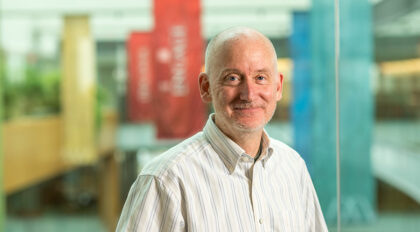
A science trailblazer retires: Stem cell researcher James Thomson’s legacy changed the future of biology
James Thomson helped the scientific world turn its attention to the remarkable stem cells that give rise to all of the building blocks of life. After more than 30 years with UW–Madison and 15 years with the Morgridge Institute, Thomson has announced plans to retire in July 2022.
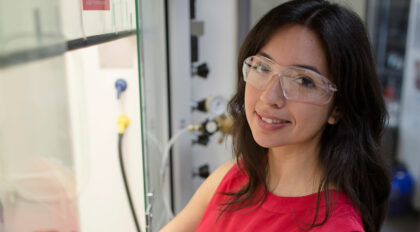
Morgridge, UW alum ‘diving into the deep end’ of vaccine development
After years of sharpening her knowledge of mass spectrometry in the Josh Coon Lab, chemistry PhD alumna Anji Trujillo landed her dream job of working on the front lines of drug development at Pfizer in St. Louis.
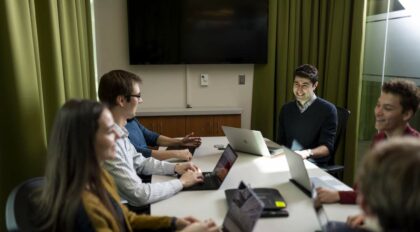
Building better proteins with machine learning
Morgridge Investigator Anthony Gitter and his team are tackling big problems (and big datasets) with machine learning. A new study demonstrates how these tools can be used to predict new protein sequences that could improve protein function.
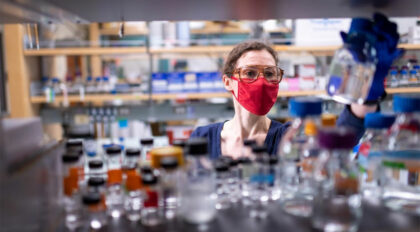
Open wide: Detecting links between what’s in your mouth and illness
Using tiny specks of dental plaque, scientists at the Morgridge Institute for the first time compiled a sophisticated analysis that opens the door to using the trove of micro-organisms in your mouth as an indicator of other health issues.
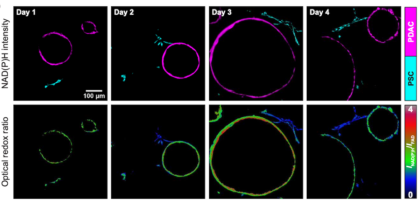
Optical imaging highlights metabolic interactions that make pancreatic tumor cells grow
An advanced biomedical imaging technique reveals how cancer cells can hijack the metabolic activity of certain non-cancer cells in the pancreas to fuel tumor growth.
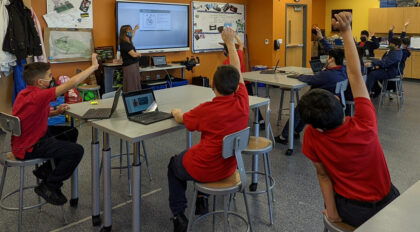
Giving middle school students a glimpse into the ‘invisible world’ of viruses
A new digital learning resource developed by PBS Wisconsin called “Meet the Lab,” which gives middle school-aged students a glimpse into high-powered research labs and the scientists who run them, highlights the Morgridge Institute virology research team.
Science for All
When you establish a planned gift, you help inspire the next generation of scientists. Planned gifts through an estate or annuities help support science education and outreach activities, like the Summer Science Camp.
Contact Bill Swisher, Chief Development Officer, today.
bswisher@morgridge.org
(608) 316-4364
